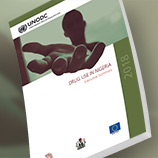
Abuja, Nigeria, 29 January 2019 - The number of drug users in Nigeria is estimated at 14.4 per cent or 14.3 million people aged between 15 and 64 years according to the results of the National Drug Use Survey released today in Abuja. The data suggests that the prevalence of past year drug use in Nigeria is more than twice the global average of 5.6 per cent.
Based on data collected from 38,850 respondents in the household survey and 9,344 high risk drug users across all states of the country, the report provides for the first time, robust data on the prevalence of drug use in Nigeria at the national level and also by geo-political zones and states.
The report shows that there is a gap in meeting the needs for treatment and care for people with drug use disorders. With close to 3 million Nigerians living with some level of drug dependence, the extremely limited availability of drug counselling and treatment services exacerbates this health crisis.
The findings of the first ever large scale nation-wide survey to examine the extent and patterns of drug use in Nigeria were released by Dr. Osagie Ehanire, Minister of State for Health; Brigadier General Buba Marwa (retired), Chair of the Presidential Advisory Committee on the Elimination of Drug Abuse; Chairman, National Drug Law Enforcement Agency, Colonel Muhammad Mustapha Abdallah (retired); Dr. Yemi Kale, Statistician-General of the Federation; the Chairman, Senate Committee on Drugs and Narcotics, Senator Joshua Lidani; His Excellency Mr. Richard Young, Deputy Head of Delegation of the European Union (EU) to Nigeria and ECOWAS and Ms. Miwa Kato, Director, Division for Operations, UNODC.
"Some of the findings of the survey presented today are striking and alarming and call for concerted efforts to mitigate the negative consequences of this rising menace on the health, socio-economic and security of our nation" said Dr. Osagie Ehanire in his remarks. While noting the considerable work already being done in the country to mitigate the challenges that drug use poses to Nigerians, he welcomed the opportunity to strengthen drug demand reduction strategies with a focus on evidence-based drug use prevention, treatment in the new edition of the National Drug Control Master Plan for the period 2020 to 2024, currently being formulated.
The report elucidates the true extent of prescription opioids use-- mainly tramadol and cough syrups for non-medical purposes; with 4.6 million people using these in the past year in Nigeria. This places Nigeria among the countries with high estimates of non-medical opioid use globally. While cannabis is the most widely used drug globally and in Nigeria, use of opioids are responsible for most of the negative health impacts of drug use.
In her remarks Ms. Miwa Kato said that any response on prescription opioids should be mindful of the "need to recognise that they have a legitimate medical use". She added that there is a need to have a nuanced approach to the issue and that it is "important to ensure that such prescription opioids are made readily available to those who have a medical need", while ensuring adequate controls to reduce their misuse are in place.
The UNODC Director also mentioned that UNODC looks forward to working with the Government of Nigeria as it continues in its efforts to "employ a balanced approach to drug control … (a strategy that) could not only increase access to drug treatment services, including for women, but also shift law enforcement responses away from the arrest of drug users to focus on targeting mid to high level drug traffickers."
National Drug Use Survey Executive Summary (PDF)
National Drug Use Survey (PDF)